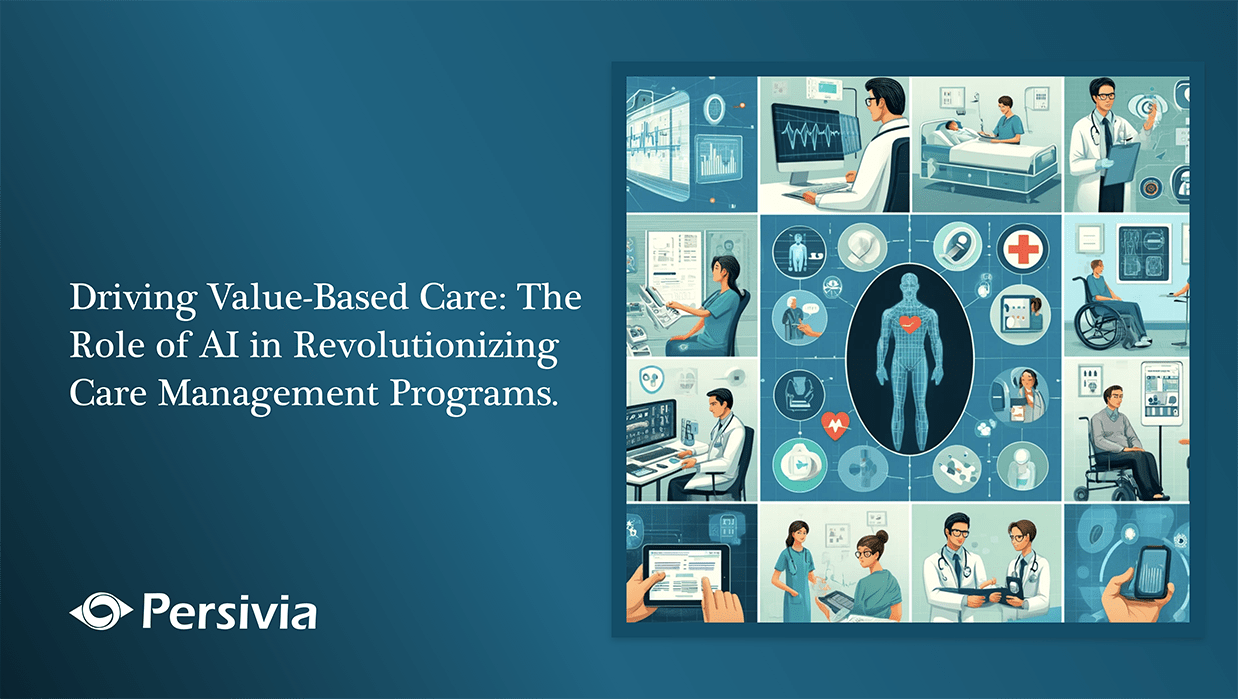At present, the integration of AI in care management programs in healthcare industry is not just a game changer, but it is reshaping the future of patient care while cutting costs. The total national health expenditures reached $3.8 trillion in 2019, where the per capita national health expenditures were $11,582, and the Gross Domestic Product (GDP) was 17.7%.
Thus, the urgency for innovation becomes obvious. The CDC data underscores healthcare spending on hospital care (31.4%), physician and clinical services (20.3%) and retail prescription drugs at (9.7%). In this financial landscape, solutions like Persivia’s AI-driven technology contribute to improved clinical decisions and patient satisfaction. Ai in care management programs evolve from traditional programs to a future where AI and data analytics play an important role in delivering value-based care to patients in the U.S.
What Is Value-Based Care?
Value-based care is a healthcare delivery model that focuses on quality of patient care, provider performance and the patient experience. Unlike the fee-for-service model, where providers are paid for the volume of services they deliver, value-based care incentivizes providers to deliver high quality care while keeping it cost effective. The key principles of value-based care are:
- Patient-Centric Approach: Making care decisions based on patients’ needs and preferences.
- Coordinated Care: Coordination with patients to meet their needs.
- Preventive Care: Implementing preventive measures to maintain and improve patient health, instead of just treating acute illnesses.
- Focus on Outcomes: Improve the clinical outcomes and patient satisfaction
The Emergence of AI in Care Management Programs
Healthcare delivery systems are shifting their focus to effectively treat patient populations, improve patient experience and reduce healthcare costs to achieve the Triple Aim by the Institute for Healthcare Improvement. Care management emerges as a means of managing the health of a defined population.
AI in Care management programs support the goals of value-based care, such as improving quality, reducing cost and delivering more personalized healthcare by catering to the unique needs of each patient.
The Role of AI in Transforming Care Management
Artificial Intelligence (AI) has a significant impact in the healthcare industry. It has the potential to transform care management by:
- Predictive Analysis: AI-driven predictive models can identify high-risk patients and recommend proactive treatments.
- Clinical Decision Support: AI can assist providers in making more data-driven clinical decisions.
- Workflow Automation: Automate administrative tasks with AI, such as processing claims, and patient outreach, improving efficiency and reducing costs.
Advancing Value-Based Care with AI
Predictive Analytics and Risk Assessment
One of the key applications of AI in care management programs is predictive analytics and risk assessment. AI-enabled predictive models can analyze huge volumes of patient data including medical history, SDoHs, etc. to identify individuals at high risk of developing chronic conditions.
Auto compose Clinical Messages
AI-powered automation can be used to generate the first draft of clinical documentation such as clinical notes, to increase efficiency.
Patient Prioritization Modeling
An AI algorithm that ranks patients for outreach, enabling care managers to prioritize patients, increase efficiency and ensure that high-value potential patients will be attended.
Automate Healthcare Outbound Consumer Messaging
AI can be used to reduce the burden on care managers by automated generation of patient messaging at various levels, including their preferred language, clinical profile, SDoHs, etc.
Automate Patient Care Navigation
A virtual assistant can support patients with care navigation (i.e. scheduling appointments, checking insurance eligibility, service availability).
AI-generated Next Best Action
AI can integrate and analyze data, and suggest personalized best actions for patients with multiple diseases.
Auto Generated Assessments, Patient Education and Clinical Summaries
AI can reduce the burden on care providers by auto-generating personalized care management program assessments, patient educational materials and visit summaries.
Auto Generate Benefits Summaries
AI can auto generate personalized summaries of benefit plans and certificates of coverage to increase member satisfaction.
Augment Data Analysis and Interpretation
AI can be leveraged for convenience of data preparation, report generation and analysis of end users.
By embracing AI and continuously adapting to the changing healthcare landscape, care management programs can play a crucial role in achieving value-based care objectives and shaping a more equitable healthcare system.
CareSpace®, Persivia’s Soliton AI engine, evaluates and refines data through advanced AI technology, and aligns closely with the goals of care management processes. It provides automated workflows to providers to view configurable clinical care gaps, AI-enhanced HRAs, automated care planning, intelligent assessment and much more while having access to the patient’s longitudinal medical records. Right from the data ingestion, valuable AI-driven insights to delivering care, CareSpace® covers everything in the care management spectrum as defined by Gartner.
Gartner has recognized Persivia for its AI-enabled solution within CareSpace® Care Management. Download your complimentary copy now to discover how AI embedded within the system can transform your care management processes and drive better patient outcomes.
Gartner
Table of Contents
